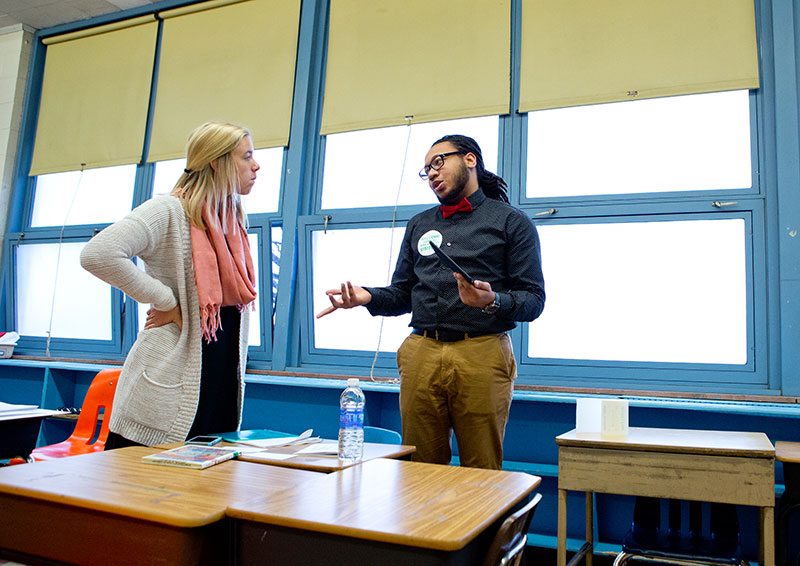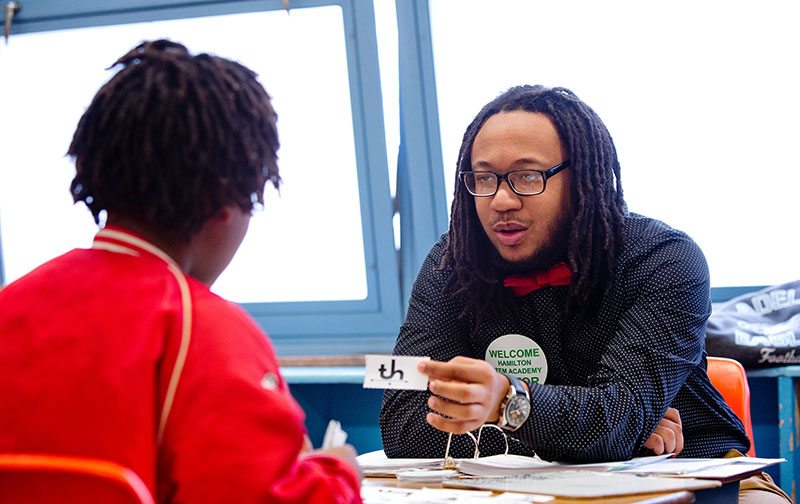COLUMBUS, Ohio—On a frigid fall morning, Cametreus Clardy beams with excitement as he crowds into a car with several of his classmates and heads a few miles away to Hamilton Elementary School.
It’s not that this trip is new for Clardy, a 22-year-old special-education major at Ohio State University. In fact, Clardy ― “CJ” to his friends —, has been making the trek to the school three times a week to help a group of first- and second-graders learn how to read. He hasn’t tired of the routine; in fact, he relishes every opportunity to work with the children.
“Students come into the classroom in the beginning of the school year already saying that they can’t read,” says Clardy, who on this day has been making steady progress with MarQualyn Jones, a wide-eyed 7-year-old who has fallen below his second-grade reading level. “I reject that. The joy is being able to watch a student read a book at the end of the semester when, at the beginning of the semester, he would just push it away.”
These are the rewards Clardy lives for, and this is his life’s calling. Early on, he yearned to help black boys excel, and his long-term plan is to become a teacher.
Unlike many of his classmates, Clardy has a unique testimonial and isn’t shy about sharing it.
The eldest of 10 children, he grew up in abject poverty in a tough neighborhood in Youngstown, Ohio. He was raised by a single mother who worked two jobs and gave birth to him when she was just 16. Clardy was just 4 when his biological father died, and his stepfather was in and out of jail during much of CJ’s childhood.


The local schools in Youngstown were so poorly run that the state eventually took them over, and crime was deeply entrenched in his neighborhood. Clardy’s mother looked to her eldest son to help raise the other children.
“I had to step up and be the man of the house,” he says, pointing out that throughout his years in high school, he cooked meals, took his siblings to and from school, and even conferred with teachers about the individual education plans for two of his siblings. “I had to learn how to advocate for them.”
When Clardy was in the sixth grade, something happened that transformed his life. He was recruited to participate in OSU’s Young Scholars Program (YSP), which is administered by the university’s Office of Diversity and Inclusion. Founded in 1988, YSP identifies and serves hundreds of academically promising first-generation students from economically disadvantaged backgrounds in urban districts across Ohio.
The program helps students prepare for college—including taking standardized exams—long before they’re in high school.
For Clardy, the experience was life-altering. By the time he was ready to apply for college, he had already earned a 25 on his ACT and basically earned a full scholarship at OSU.
His mother welcomed the opportunity for her son to escape the poverty of Youngstown and become the first in his family to attend college.
“My mom really pushed me. She expected me to get all A’s,” says Clardy, who enrolled at OSU in 2011 as a biology major, but quickly changed to special education. “Youngstown is such a rough environment; she wanted her children to have whatever opportunities were available. She really pushed the envelope.”
Although Clardy spent the summer of his junior year in high school on OSU’s campus, culture shock hit him hard when he enrolled as a full-time, first-year student.
“It was uncomfortable,” he says, recalling the dearth of African-American males on campus. “It was something I definitely had to adjust to. I was one of two black males on my dorm floor, so I had to legitimize my presence.”
Clardy also had to combat the assumptions of many of his peers regarding the scholarship program that had enabled him to enroll. Though he excelled in high school, many had concluded that he had only been admitted to OSU because of his race.
By his own admission, Clardy’s first quarter at OSU was rocky.
“My mother had relied on me so heavily to step up and be the leader of the house, and since I was not there, that created some frictions,” recalled Clardy, who managed to end his freshmen year with a 3.0 GPA.
In subsequent semesters, he’s impressed the faculty by making the dean’s list. He plans to pursue a master’s degree in education before gaining some experience in the classroom. He’s been awarded a Weiler Scholarship ― an OSU program that supports and funds African-American education majors who plan to teach in inner-city schools.
James L. Moore III ― Distinguished Professor of Urban Education and executive director of the Todd Anthony Bell National Resource Center on the African American Male at Ohio State—is instrumental in choosing the Weiler Scholars and serves as their mentor as they work toward their degrees. He has no doubts about choosing Clardy for the honor—or about the young man’s future success.
“CJ has consistently and unselfishly given his time and talents to enhance the student experience for other African-American male college students,” says Moore. “He has certainly left his mark at the university and beyond.”
Clardy, who is scheduled to graduate from OSU in May, counts his involvement in the Bell Center as a highlight of his time at the university.
According to Moore, about 500 of the nearly 1,200 black males enrolled at Ohio State have a cumulative grade point average of 3.0. While the six-year graduation rate of African-American males at OSU remains lower than that for the student body as a whole (67 percent vs. 83 percent), Moore says progress is being made.
For Clardy, the opportunity to work with the Bell Center staff and students has been transformative. It started when he participated in the Early Arrival Program that brought incoming black males to campus early for a special orientation.
“It feels good to sit in a room with 50 to 100 other black males at OSU who are pursuing their passion,” says Clardy, adding that Moore and other Bell staff members have become father figures to him. “I grew up not having a dad around or in my life. I just didn’t have that consistent presence.”
Clardy is now busy conducting undergraduate research on the lived educational experiences of African-American males. His work with the Bell Center has expanded his horizons, taking him to conferences in Jamaica and Brazil.
He’s also paving the way to mentor a legion of younger black male students at OSU.
“I get tired of being the only one,” he says. “I want to see a lot of us, a surplus of black men. I feel that to whom much is given, much is expected.”
Moore says that Clardy’s academic success defies the stereotypes that so many have of young, urban, African-American males. “CJ is a first-generation college student who has committed himself to academic excellence and achieving his lifelong dream of becoming a teacher. As a proud native of Youngstown, Ohio, he is keenly aware of the benefits of a quality education and having access to educational opportunities,” says Moore. “As a college professor and administrator, I hope (people) realize that there are young African-American males like CJ all around the country.”
